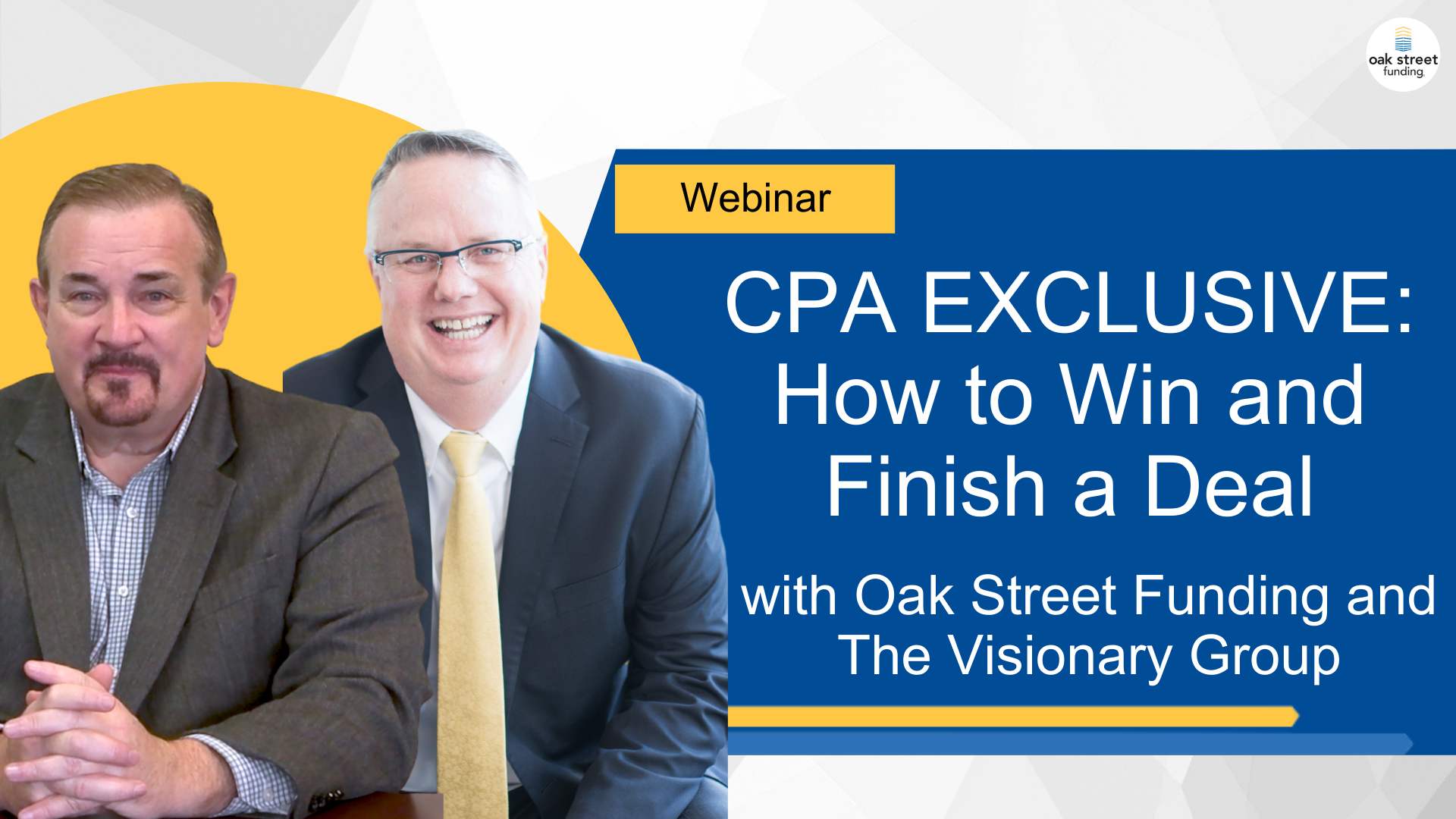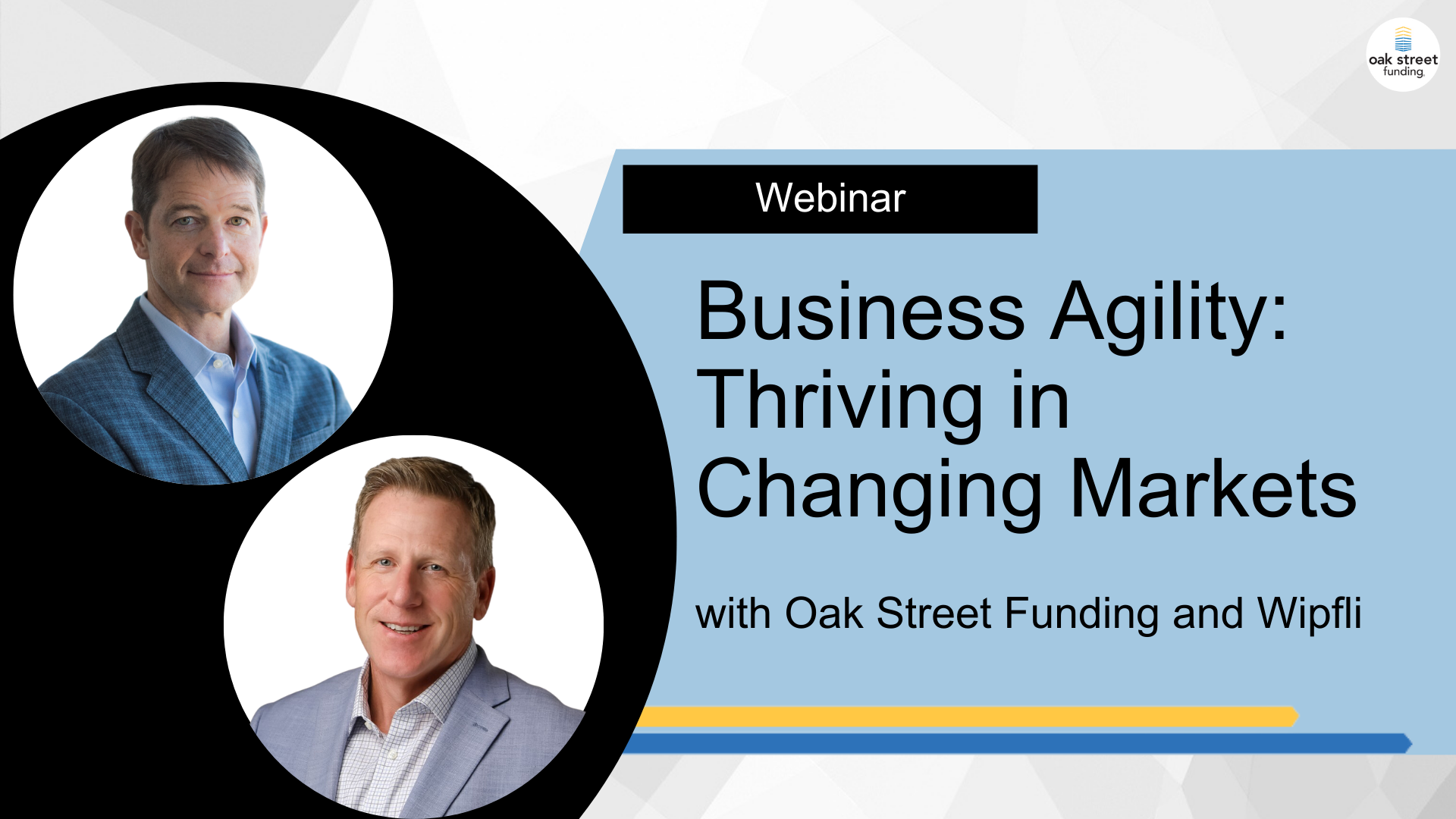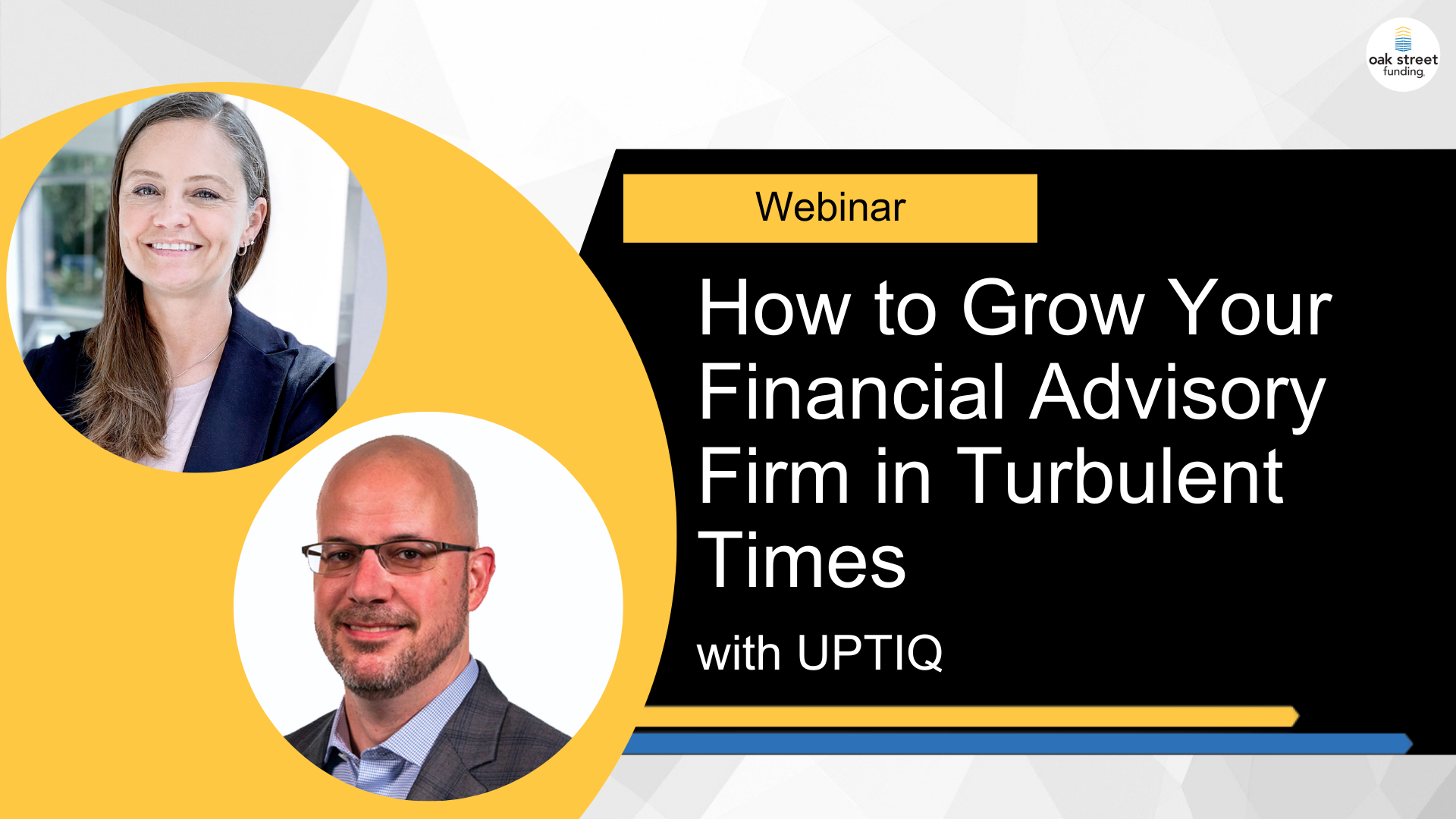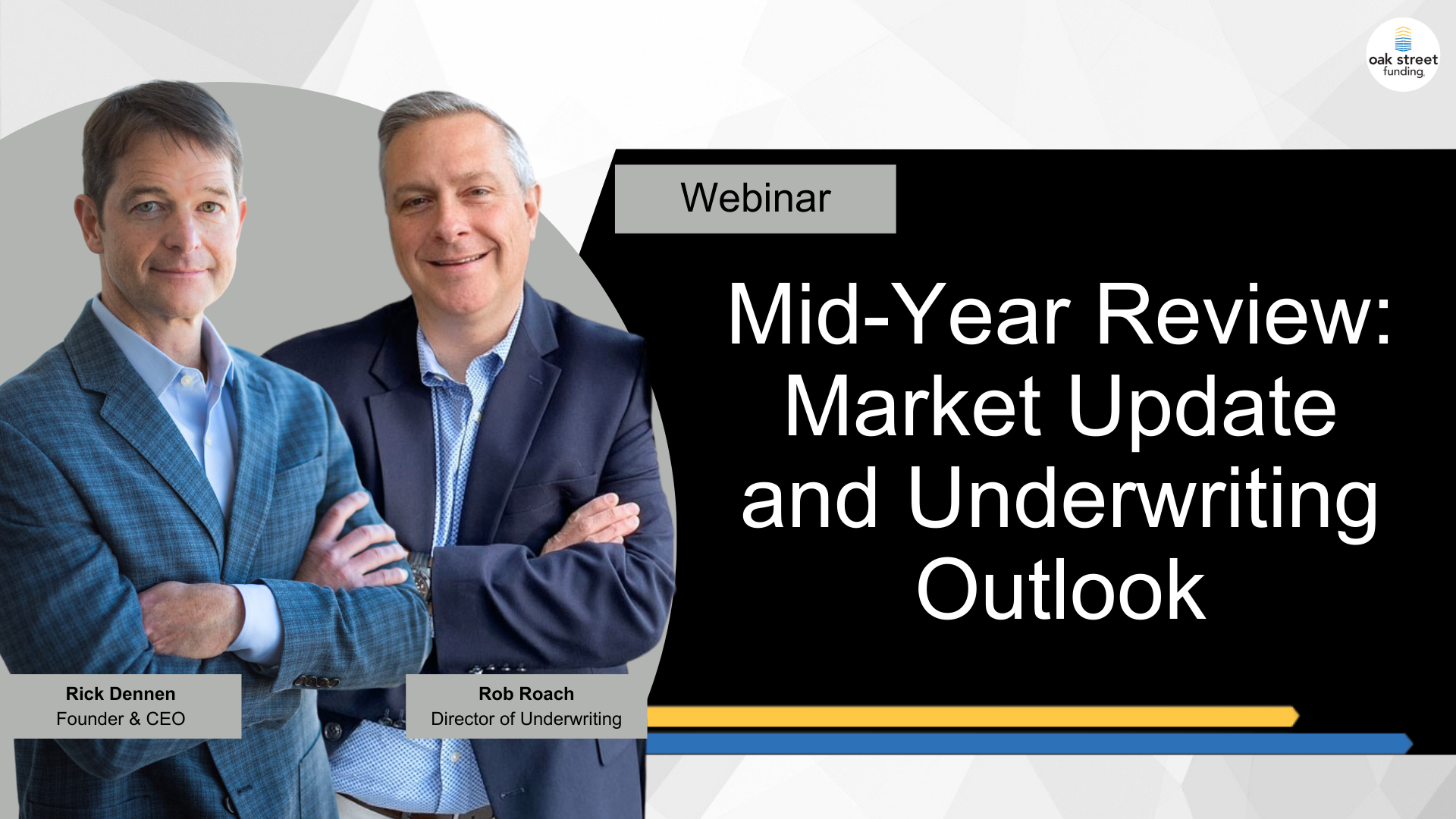CPA EXCLUSIVE: How to Win and Finish a Deal
- 0.5
- 1
- 1.25
- 1.5
- 1.75
- 2
Bridget Haight: Hi, everyone and thank you for joining us live today. I am Bridget Haight, host and moderator for Oak Street Funding OnPoint webinars and podcasts. Today, I am happy to be joined by Bruce Warren, vice president of strategy markets here at Oak Street Funding and Bob Lewis, president of the Visionary Group. Feel free to use the chat on your right side of your screen if you have any questions for Bob or Bruce and you will also receive this content in the next few days with their contact information, as well for any follow up. We have only 30 minutes today, so let's get started with an overview question from one of our registrants. Bob, I will start with you. So, how long is the ideal deal when selling a firm or buying another firm?
Bob Lewis: Okay, there's really two pieces to that question. There's obviously the sellers and buyers. There's two different components. If you're selling a firm, typically the deal can go quicker because you already have an asset that's going to go to market so the question is finding the right buyer. We've always found those to be a shorter cycle. However, the shortest cycle we've ever done has been two months and everything was very aligned in that particular opportunity. If you're buying, that's typically can require a little more time because you have to find the right person to acquire or merge into you. You're searching and the search can go a little bit longer. We've had some clients that search for a couple years to find the right fit because they're only going to take a deal that's good. So, you're really looking at a minimum of two months, likely looking more like it's six months and if you're really doing a continual search, that's just going to continue to go year after year after year looking for the right opportunity. Bruce, what's your experience been?
Bruce Warren: So, my side of the equation is lending so obviously, that's a little bit different from what Bob's discussing. So in my view, it's 30 to 45 days from start to finish is the ideal time. If it was my client's decision, it would be tomorrow, but we try to land somewhere in the middle just to make sure everyone's prepared to get this thing done from a financing side. By that, I mean, make sure your financials are up to date, the seller's financials are up to date and all the information requested from the borrowing side are delivered. But yeah, definitely 30 to 45 days is a good thing to shoot for from an acquisition.
Bob Lewis: Right. So, just think about this as two stages. So your first stages is really the hunt. Either finding a buyer or finding the firm to acquire, which can be a much longer variable. Once you've got one locked down and you've got everything in order going over to Bruce or for the financing arm, you said it's a much shorter timeframe, but you can tack that onto the back end of the cycle or in the middle of the cycle. If you haven't quite completed the deal structure, you can still get most of the other pieces lined up. So, and it is an interesting market out there right now, Bridget. Let's leave it at that. It's a very interesting market. Every day brings a new opportunity, some are fun, some are problematic right now, and I think it's going to continue for quite some time.
Bridget Haight: Okay. Okay. The next question I have is I am interested in the accounting firm market and what it takes to buy a firm as I hear PE is driving up prices.
Bob Lewis: So Bruce, you want me to take that first?
Bruce Warren: I'll do my side first, since it's probably going to be a shorter answer than yours. I've got a couple firms right now that actually use PE money to help with their acquisitions, but these firms, the PE firms that I'm discussing, they're more passive and they're looking for longer term, I guess, gains from their involvement with these accounting firms and they let the ownership right now determine the pricing on what they're going to be buying. So anywhere from.8 to 1. 2 times is the typical market right now with my guys driving the bus. With the PE money behind them is the cash end of the deal, they're really not actually determining what the price is. So my aspect's a little bit different than what I think Bob's going to answer right now.
Bob Lewis: Well, there's some overlap there. So part of the story on the private equity right now, it's widespread in the accounting profession and I don't think it's just limited to the accounting profession. We have begun a lot of non- accounting firm mergers and acquisitions. So we're looking for tech companies, medical consulting companies for our CPA inaudible clients to acquire. The private equity money's been in that space for a longer period. So, they're used to dealing more with multiples. One of the things we're finding right now, changing in the market on terms of values with private equity, which like I said, every day is a new adventure, you used to price these off of EBIDA, okay? Now, we're finding some of the tech firms and some of the consulting firms that haven't really developed strong EBITDA because they're either investing back in the company or they haven't made the profitability they thought. They're now changing the pricing structure to a multiple of revenue, which goes almost back into how the CPA firms have been doing things for, it seems like the last two or three centuries. So, the private equity market's getting really interesting. We've been contacted by several private equity companies just in the last few days and many of them are trying to figure out what the play is in the market, where to go. Everyone wants to start at 100 million dollar plus firm. But when you look at the CPA firm market, there's 15 firms that are 100 million dollars plus. It's not a huge number. Go to inside public accounting and look up the list and you can see the number. And even the 50 to a 100 million range, it's still a fairly limited box of people. So, what everyone's trying to figure out is in the PE side for the CPA firm, is it a long term play like Bruce, you had indicated you've got a client that's in a long term play, or are they doing it more for the short term? The typical answer we've seen so far is to looking at probably a good three to four year window at least. Some are buying it to hold and resell, others buying it, like the one we talked to yesterday, they're buying it to then introduce their wealth management arm, their insurance services arm, their cyber arm, into the client base.
Bruce Warren: And to that point, I mean, two of the verticals that we're in besides accounting firms are insurance and RIA firms, investment advisory firms. And to answer that question, as far as they're definitely driving up the multiples on the PE side on that side because the acquisitions are going through the roof. It's not really impacted the accounting side too much yet and the whole periods on these PE guys are getting into the accounting are seven to 10 years. That's what I've been hearing right now. So, I don't think it's really been impacted yet for these multiples.
Bob Lewis: It really hasn't and I think the whole market is still really exploratory. The other thing we keep hearing now is a lot of the transactions that have occurred because one of the core differences in the accounting profession, if you're doing insurance work, that has to be put into a separate entity. So you have to create an alternative practice structure to make that work because of ownership can only be in the assurance function, I think it's 60% owned by a CPA, okay? So they've had us do some separation of the businesses. But one of the other things we're seeing too is, or haven't really haven't really witnessed it yet, to be honest with you, I'm hearing it, is a limited controlling interest. So instead of me buying 70% of Oak Street Funding, I buy 35%. So you still have controlling interests at Oak Street Funding if I were to buy... for private equity to buy your organization. You'd still have controlling interest, but I would have 35% ownership. That to me changes the whole market in the CPA profession because the principles that were in charge can still remain in charge, they're just going to get funding to help them execute some of their plans, which may be to pay out the exited partners or exiting partners, take some money to buy a tech company or some other auxiliary businesses or make investments in technology. And that's not such a crazy option. So I think that's one of the tools that's going to come into play. What I have seen though, is some firms that are smaller and smaller by the way, meaning 5, 6, 7, 10 million dollars, that have been bought by private equity already, in the CJ profession. That's an interesting model because I haven't quite figured out who's making those acquisitions, but I do know that just about every CPA firm of the country, more than a couple million dollars seems to be getting inundated by private equity calls. Every major party we talk to says," Yeah, I get two or three of them a week at a minimum from different private equity companies."
Bruce Warren: Well, they definitely solve problems. I mean, with that kind of capital coming in as far as deferred comp and things of that nature from succession. So it's a different aspect, which is great for the industry. I mean, it just keeps it fresh, right?
Bob Lewis: It's another change. It's a layer of change and honestly, I think it's going to force more and more firms to get... I don't want to use the word out of compliance because compliance is what they're there for the core function. It is always going to be the revenue stream, but it's going to force more and more of the diversifying the advisory sector and we are seeing firms from 10 million on up, 20, 30, 40% advisory revenue now and we're not talking about tax consulting as advisory, we're talking about pure management consulting or different service models like a cyber or a wealth management, which to me is a really missed arm still. I think investment banking is another huge area for CPA firms to get involved in because they have so many clients that need to sell because of aging baby boomers and there's a lucrative revenue stream inside that investment banking arm that also feeds evaluations, states, trust, a whole bunch of different areas plus the whole wealth management side.
Bridget Haight: Bob, I'm very eager to move on this next question. Will Bob be demonstrating how he uses his sledgehammer to close deals?
Bob Lewis: Okay. So, the sledgehammer is too heavy now. I'm older now, so I need to go to a smaller little mallet, but I think I know the... There's a client who's registered for this, I'm pretty sure I know asked this, but I will not call them out. The issue on the sledgehammer is, and I know he's joking a little bit, but there's some truth to that. We've been having a lot of tough love conversations with firms. Firms that have too many 1040s, too low a price on 1040s. To us, that tells us a lot about the pricing in the firm overall and we've had quite a few conversations just in the last few weeks with firms saying, look, here's the situation our client would like to proceed, but we're going to have to increase the 1040 fees by probably at least 50%. And then maybe again, 50% the year after and whatever falls off, falls off because we can't afford to do the work at the level that they're at. Plus to be blunt inside a lot of firms, there's their staffing shortages. They really don't like doing the 1040s and it chases away a lot of staff. The bigger thing though is when you start peeling back the layers on that, we also find out their accounting services are a little under priced. So their overall business tax work and the rest of it. So, fee increases are almost mandatory inside the CPA profession right now because of staffing shortages and what most firms are finding is when they increase fees, there's almost no blow back, which is disappointing to some because some are doing it to get the clients to leave so they've got less to work on, they can manage it in the workload. While they're finding is they made more money off of it, but their problem didn't go away of still having too many clients to work on. So there's a huge revelation going on in this profession right now and I think it's going to be fascinating, but we'll move past the sledgehammer. But there's a little sledging that does happen. So... Bridget, what other fascinating questions do you have right now?
Bridget Haight: All right. So, we'll move on. So this next one says, what are the top three reasons a deal fails? I would love to hear from both of the panelists on this and how it could fail at either step.
Bruce Warren: I'll start. I mean, I just listed out three that we run into from a capital side, which is when one of our borrowers buys somebody their retention expectations. So when they're telling me that they're going to retain 95% of the clients, sometimes that gets a little out of whack maybe six months into the deal. That's one reason they fail. Lack of working capital is another one. They just don't have enough cash to handle that three to four month delay after they've bought somebody to handle billing delays, potential hiring issues or things like that. So they just don't plan properly from working capital. And then, the last one is overreaching either on the size of the transaction they're doing, they're buying somebody bigger than themselves, or if it's a geographical problem from location. If they're buying from one state to another and trying to operate that other practice out of state, that sometimes is a reason they run into trouble.
Bob Lewis: Okay. So Bridget, I misheard the question. I used three squared inaudible I have nine reasons and I just stopped after nine because...
Bridget Haight: I'll cut you off after five minutes.
Bob Lewis: So one, value expectations as Bruce has alluded to. The value expectations are... It's not uncommon we have a conversation with a firm, we're like," What's the firm worth?" The answer, real answer is what someone's willing to pay for it, but you have to get realistic about how you price the firm. I just had a conversation with a firm this morning, a client of mine that is a passive client that we don't talk with as often and they're acquiring a small practice and the practice wants multiple of 1. 2. And then, we started talking about their 1040s that are under$ 400 and they wanted multiple of 1. 2, which makes absolutely no sense at all. If it was a$4,000 1040, maybe they could multiple over, but... Second is leadership's inability to give up control. So I want to merge or sell so I can give up some of the risk, but I don't want to give up the ownership. We hear all the time from people that are 65, 66, 67," I'm in my best health ever. I want to sit in the executive committee in the firm and I'm going to have a 3% interest in the firm only, but I want to sit on the executive committee." You've got to be prepared to give up control. Third, emotional decision. I want to go, but I really can't. So I talk like I want to go, but at the end of the day, I won't because emotionally I can't let go. They're just not ready to do a deal. The poor deal economics, too many low 1040s, lack of staff. So buying a book of business is tough right now. Firms don't have the resources so buying a book of business makes it very difficult to do that. I've got the wrong sized clients. I have a client mix of one to five, Bruce's clients are typically 10 to 100. I can integrate them in, but I have to understand that my practice may not go at the same value as Bruce's and I may have to make some changes if I want to merge into Bruce's practice because my client base is different. The last three, material billing gaps. So I bill at 100 dollars an hour, Bruce bills at $400 an hour. That doesn't mean my compensation's going to go up because I'm emerging into Bruce's firm, but that gap may be so wide our culture may be different, the type of clients we go after, our service model may be quite different and that gap may be too big to overcome. That doesn't mean a $50 gap or $75 gap's a problem, but you can't expect my clients to go from 100 to $400 an hour, but they could go from 100 to 125. Last two and the last one's the most important, but too many billable partner hours. So we talked to firms that have 2000 billable hours per partner, that talks a lot about the big issue coming up next, which is firm culture and culture is where there really been a big push. If firms don't have the right culture, a work friendly culture anymore, they can't attract staff. And the reality is if you want to build 1500 to 2000 hours a year as a partner in a firm, it becomes a difficult to move firm and even though the profitability may be very high, it's shocking to believe that a highly profitable firm with... Is because of the fact they've got a lot of partners but only 2000 billable hours, actually has diminished value because to replace all those partners is a very difficult task to do.
Bruce Warren: Which one is your number one on that list?
Bob Lewis: Well, number one on the list, flat out, if there's no cultural fit, goodbye. Because no matter what, even Bruce, if I was coming into your firm for just a year to transition, that would be a nightmarish year if we have a mismatching culture and on top of it all, there's a good chance a lot of my staff is more in line with the way I've developed my firm versus how you've aligned it.
Bruce Warren: Yeah. I mean, that one should be on my list as well as the decision to leave, giving up control and evaluation. I mean, so maybe I should have done three squared too, sorry, but my number one is definitely the overreach inaudible. It's just trying to buy in a different location either out of state or too far away. But that's my biggest one.
Bob Lewis: See, that's interesting because from my perspective, that's not as big of a factor, but from a financing perspective, that may be a factor for you as well. So...
Bruce Warren: It is.
Bob Lewis: ...when you look at the mix here, you have to look at the overall deal. So if you're doing a deal with Omni financing, they could have different considerations than when you're doing a deal where financing's involved.
Bruce Warren: I mean, it just bleeds into the leadership control too, if it's in a different state. So if you have some manager that you're buying is over there and they want to run it the way they want to, so that fits into the culture and it just all blends together. So...
Bob Lewis: It does. It does blend together. The biggest thing is having somebody... I had another meeting yesterday with a different client and the way we ended the meeting was... It was a good ending. Our client who was the larger firm said," Look, we want you to take a week or two just to make sure that your head is really in this, that you're not just sampling to do this, that you're committed to wanting to go forward with something like this, because if you're not, that's okay too and even if you go forward and it's not the right fit down the line for all of us, that's okay. But if you're really not sure, don't start the process because it is just..." It's not a good use of everyone's time, plus quite frankly, a lot of misinformation then typically starts to occur. So our clients actually sit... I'm talking to the candidate firm about what their thoughts are in about week or so just to get it... I think that one's going to proceed to a next level, whether it's a successful next level we'll see, but they'll definitely meet again.
Bridget Haight: Okay. These are great answers. I'm going to move on to the next question that we had for you. It was, I would like to listen to their thoughts on which type of parties to involve during certain types of deals.
Bruce Warren: Want me to kick off?
Bob Lewis: Bruce? inaudible
Bruce Warren: So, if I was buying a firm, I would definitely engage someone like Bob, who's a consultant in the industry and definitely give some advice on how to structure transactions or agreements, but I would leave it to the lawyers to definitely structure agreements if it's a partnership issue or if it's an actual buy sell. And then, from an internal standpoint, have a transition team ready, especially if it's a larger acquisition. So someone that can integrate software, someone that can help with employment contracts with non- compete, the things that might be necessary for when you do an actual transition. Those are the three top ones I can think of.
Bridget Haight: Bob, how about you?
Bob Lewis: I'm going to be parallel, but I'll take a little different cut. So using any outside person understands accounting firm transactions like us or someone else or if you're doing it in a different industry or for a different client, someone who has some familiarity with M&A and better yet, M&A in a specific sector, because we do see a lot of M&A people that get involved in so of these transactions we're in, that do other companies but don't understand the CPA profession and they actually mislead the client. They don't understand the profession enough to understand how a transaction should be fair on both sides. They also don't know what questions to ask. So a huge mistake that we made and we identified this about three years ago, massive mistake. We thought we would get an opportunity for Bruce, who's a CPA managing partner of a firm and we'd get him an opportunity to talk to a candidate firm and that maybe would be you Bridget, right? We'd put the two of you together, you guys would have your meeting and the meeting would come back with," Ah, it didn't really work out right it wasn't a good fit." Whatever. So after a pattern of seeing this, we talked to Bruce initially, and then we talked to you initially Bridget. We're like, it sounds like it should be a good fit. So what went wrong? What we found out is if we're not sitting on the initial calls for 99% of our clients, people don't know what questions to ask. So they immediately start asking questions about," Well Bridget, how much money do you make a year?" And let's talk about your realization and utilization as opposed to talking about the firm and the vision and where to go and sorting through some of those other questions a little bit later. That was a huge learning mistake. The second thing is the attorneys that Bruce had mentioned. So what we do is we put together a... We call it a draft letter of intent or some clients that prefer an MOU, memo of understanding. But if I can't get you and Bruce to agree on those terms, there's absolutely no sense to bring it to an attorney yet.
Bridget Haight: Right.
Bob Lewis: Because I'm wasting everyone's time. Now however, the next step is we always caution everybody is Bruce is going to bring it to his attorney, you're going to bring it to your attorney and then the redlining starts. And because they're all trying to protect their party, right? So one of the things we counsel both parties on before they bring it to their attorney is, look, the document we have in place is a fair document. Everyone agrees. It's fair for both parties. The attorneys are there to put it... If I'm representing Bruce, Bruce's attorneys are to get it in a legal format to give it to you, Bridget, to give it to your attorney to go," Yes, this looks solid." Not to start to renegotiate the terms, okay? That rips deals apart, because you'll have a real estate attorney looking at this contract going," Well, we need to make this all to your favor." Or somebody who does environmental law because he's a neighbor of mine and he starts looking at the contract. The last is the post integration team. So, first time in our experience the other day, we had a larger firm that asked us to identify somebody who helped with the post- integration. They said," We have the people in house, but we don't want to take them off track and have them do things that takes them off their mission of what they're doing." They know those people, like their director of HR, will have to get involved, but they want the director of HR involved after the post- integration team has already identified what steps to do and then bring in the right people.
Bruce Warren: That makes sense. Yep.
Bob Lewis: Yeah, it does make sense and we've identified a few people that can do that work. We could, we don't want to. I don't mean to be rude, but there are people who do that end of it better than we would. They know how, they know the software, the systems, the integration, the processes more and that's an interesting area that I think a lot of firms need help with because a lot of the deals go wrong because they don't do the integration properly or they don't talk through those off the front end. Bridget, coming back to you.
Bridget Haight: Okay. I'll move on. So the next question is how does inflation impact deals immediately and then again, in the future? Is there a looming recession and how does it impact the modern accounting industry?
Bruce Warren: inaudible I'll take my part since it's the easiest, since at 2:30 today, they're going to be making a decision that immediately impacts my product. Rates will definitely be affected. If rates keep going up, it's going to affect borrowing costs, which are going to affect prices of practices that you're buying and how much money you have to put into them. I mean, that's going to cause fee pressure internally too from the accounting firm. They're going to have to increase fees potentially to keep up with this inflation. I mean, that's just a basic fact at this point, unfortunately, but I mean looming recession, all the signals are there, but I can't predict that and I don't think I'm allowed to actually say that as a bank employee on TV right now. But so... I won't make a comment on that. I'll leave that to Bob.
Bridget Haight: Bob?
Bob Lewis: So, that's a national theory of economics, right? If interest rates go up, there's going to be more cost and more pressure on cash flow, right? So the thing on how it impacts the accounting firm profession, I'm looking at this one with a little different lens, okay? Will it decrease the value of some of the firms maybe? Potentially yes. Especially if there's outside financing required to make a deal structured go through, but if there's no interest rate on the firm comp program and it's put in that way, I'm not sure how much of an impact that's going to have, but again, yet to be seen. The bigger impact I think is going to be is since there is a good staffing shortage in the accounting profession right now, even if a lot of the clients start to struggle a little bit because their interest rate issues, there's so much work out there that firms are actually just walking away from and not even pursuing, that I think that all of that backlog work would backfill any shortages a recession could create inside the client base for a CPA firm.
Bruce Warren: Mm- hmm(affirmative).
Bob Lewis: But ironically, since we've spent a trend over the last couple years, I think what's going to happen is the government's going to pass a recession relief act that'll have all kinds of tax incentives in it. Maybe some recession released PPP money on top of it all. That's probably too far stretching, but there'll be all these incentives that come out that the CPA firms are going to have to figure out how it applies to their clients. It's probably going to actually create more specialized tax work for these firms because of the recession because of the trend we've actually set. I know that sounds crazy, but...
Bruce Warren: No, it doesn't. That's my theory. As long as there is a Congress, there's going to be tax law and it'll always stay busy in some form or fashion, but I think you're right on the money there with that one, as far as potential tax relief coming down.
Bob Lewis: There's one other factor here in this recession, it's a little different, If we have a recession. I shouldn't say we have one, because I'm not an economist, I just play one on TV. So, the other thing to get some thought to here is okay, in prior recessions, we've got massive aging baby boomers. So 67 is the average age for the baby boomer population, that to my last count of any survey information I had, owned about 60% of the businesses in the United States. So think about that. If the average baby boomer's 67 and baby boomers own 60% of the companies in the United States.
Bridget Haight: Wow.
Bob Lewis: Rush going out the door, right? Everybody's going to be cramming into the doorway at one time trying to figure out how to get out, which will have an impact on firm values, right? And I'm looking at this from a recession standpoint, if everyone starts to flood to the door and try and leave, the buyer pool will get more selective, prices may adjust, okay? As well as the impact now is, do I need to use cash in a deal on some of these or not? And if I do, how's that cost going to impact the value of the opportunity that I'm buying? I just think it's going to be very interesting because of this baby boomer... You remember the George Clooney Perfect Storm movie where all the storm converged on the little boat that never made it out of the water?
Bridget Haight: That's what it'll mean?
Bob Lewis: A little of that going on and I think it's going to be very interesting. I think the only thing is the CPAs have is they've got that helicopter that goes above a lot of the water because they've got the staffing shortage right now and they can absorb and take more clients if they need to, even if they do have to take some of the...
Bruce Warren: So am I the boat in that situation? Are you the boat or is it the CPA owner?
Bob Lewis: You and I are both. Bridget, we're all in the boats. We're in the...
Bruce Warren: Are we on the other boat that's catching all the fish?
Bob Lewis: It's the CPAs that are sitting way up in here, inaudible up in the helicopter. But I've been at this for a long time. Bruce, you've been doing this for quite some time. It's just an environment that I've never seen before. We're getting bombarded with people who are asking us questions about their succession plans, their firm value, how to structure a succession plan. We talked to one the other day, they got a two year window, okay? This is a good sized firm. I mean, they're over five million, under 10. I think of a two year window when basically all the three equity leaders are going to leave and they're putting their income partners in sales training. Why would you do that? Why would you put them in sales training? If they're not selling already, they're not going to sell in two years. To learn to sell takes much more than two years, so they're going to be forced to have to merge that firm upward because they're not going to have anybody that can bring in the work, but people are grasping at some straws out there trying to figure if we can put them into sales training, at least maybe I'll get somebody who can buy us out. They have the other issue of how do you convert the income partner into an equity partner to want to buy them out first? Which is Bruce, do you have a... You've got a funding tool for that, right? This is not an infomercial, okay?
Bruce Warren: No, definitely. I mean, we do that. I mean, that's one of the things that we specialize in, to handle that succession need from a capital standpoint.
Bob Lewis: Right. So you can fund my buy- in to...
Bruce Warren: Correct.
Bob Lewis: ...Oak Street as a partner in Oak Street. And then you get capital into your account and you're guarantee on my buy- in on that is my interest in Oak Street, which either you're going to give the money back to whoever you borrowed the money to, whatever's left and then the interest in the firm is what really is your collateral.
Bruce Warren: Mm-hmm(affirmative). That's correct.
Bob Lewis: I mean, I think it's an interesting product. It solves from capital and cash flow needs. The other question is how do you actually determine how much the value of the firm's worth and how much capital is needed for me to buy five or 10% of Oak Street? I'm using Oak Street Funding, simply as an example.
Bruce Warren: I know. I want to find out when you're buying part of Oak Street. I can't wait.
Bridget Haight: We might have to save them for the next webinar. We are actually at time. You guys, you filled that 30 minutes beautifully. It was fast. Thank you so much for your incredible insights. That is all the time we have today, but as we get more content from these two, we will send these your way. Stay tuned for more webinars from Oak Street Funding throughout the summer and catch our next podcast episode on Tuesday, June 21st about hiring and retaining diverse talent. Have a great day.
Bob Lewis: Thank y'all. Appreciate your time.
Bruce Warren: See you Bob.
Bridget Haight: Thanks Bob. Thanks Bruce.
Bruce Warren: For what?
DESCRIPTION
Do you know what it takes to win an acquisition or set your business up to sell effectively and for profit? Do you understand the nuances to get your deal over the finish line where all parties can succeed? Bob Lewis, President of the Visionary Group, and Bruce Warren, VP Strategic Markets at Oak Street Funding were LIVE on June 15th to discuss using financing to leverage yourself to make a deal work. Want to learn more? Call 844-353-8022 to speak to an Oak Street Funding team member today.
Today's Guests

Bob Lewis

Bruce Warren








